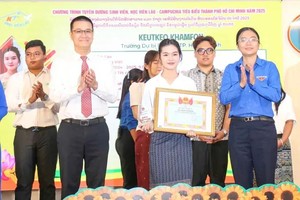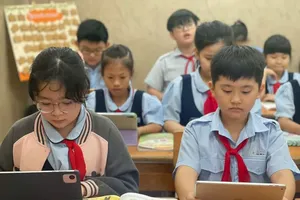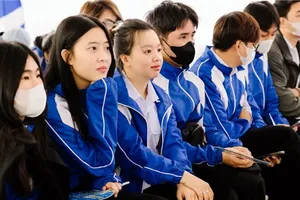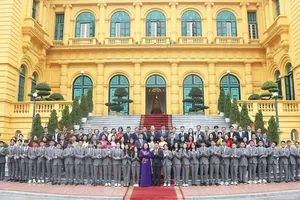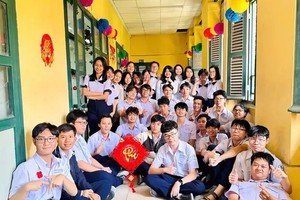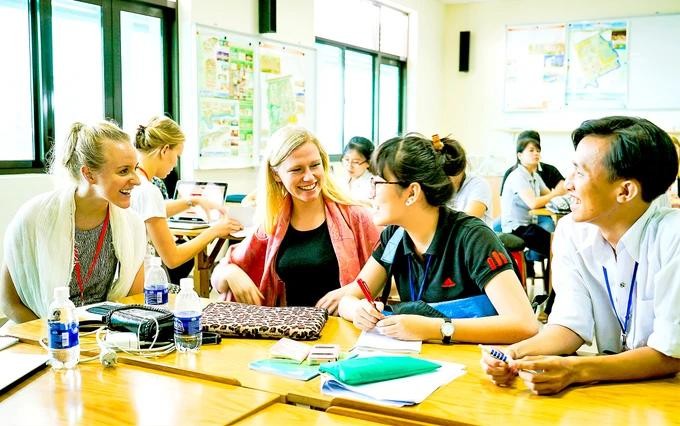
This trend underscores the growing recognition of the quality of Vietnamese higher education, attributed to universities' emphasis on quality assessment across both training programs and facilities. This positive signal encourages Vietnamese universities to further promote global integration in education and enhance their quality standards.
The Department of International Cooperation, which is part of the Ministry of Education and Training, has reported that in the upcoming 2023-2024 academic year, Vietnamese universities are expected to receive approximately 22,000 international students.
Among these, approximately 4,000 students are enrolled through formal agreements, while the remainder are either self-funded or participating in bilateral agreements at both the school and local levels.
The population of foreign students in Vietnam has shown a steady increase over the years. During the 2020-2021 academic year, there were 18,500 international students, which rose to 21,000 in the 2022-2023 academic year.
Statistics from each training institution indicate a significant rise in the number of international students engaged in study, exchange programs, or full-time studies. Over the past five years, the influx of international students at the International University for credit exchange programs has nearly doubled compared to the previous year. The majority of students are opting for fields such as Business Administration, Biotechnology, Biomedical Engineering, and Information Technology.
Currently, 612 international students are enrolled in full-time training programs and academic exchanges. In the first semester of the 2024-2025 academic year, 52 students from many countries in the world will be studying full-time.
In addition, the school also organizes cultural and academic exchange activities.
Over the past 5 years, Ton Duc Thang University has welcomed approximately 10,000 international students to study, intern, participate in exchange programs, and engage in cultural activities.
During the 2023-2024 academic year, the school welcomed 2,065 international students, including over 400 enrolled in intensive, full-time training programs. These students hail from a diverse array of countries, including Laos, Myanmar, Cambodia, Thailand, Indonesia, the Philippines, India, and Korea.
A variety of majors draw large numbers of international students, including Vietnamese Studies, Business Administration, Information Technology, Electrical and Electronics Engineering, Pharmacy, Industrial Fine Arts, Biotechnology, and Foreign Languages.
The Ministry of Education and Training reports that student exchanges with foreign countries have facilitated cultural and academic cooperation, strengthening international solidarity and integration. Statistics indicate that many universities, including members of Ho Chi Minh City National University, Ho Chi Minh City University of Economics, Nguyen Tat Thanh University, and Ho Chi Minh City Open University, now host a substantial number of self-funded international students.
According to Head of Communications Department of International University - Ho Chi Minh City National University Nguyen Thi Bich Ngoc, the school's advantage of offering all-English instruction has attracted many students from around the world.
She emphasized that several additional factors significantly influence international students' decisions to enroll at the institution. These include a variety of diverse and interdisciplinary training programs that enhance the likelihood of selecting a major aligned with the needs of international students.
The institution features an International Education Exchange Center dedicated to providing guidance and assistance to students regarding visa applications, housing arrangements, and acclimatization to their new surroundings. Notably, the International Education Exchange Center consistently organizes a range of activities aimed at attracting more students to Vietnam, and the training programs and facilities are recognized on an international scale.
According to Principal Tran Trong Dao of Ton Duc Thang University, the key factors that draw international students to study in Vietnam include modern facilities and equipment, an internationally-standard learning, teaching, and research environment, English proficiency of lecturers, Vietnamese culture, and a dynamic, professional, and responsible academic approach, based on feedback from partners and international students.
Furthermore, it is essential for the institution to possess a strong reputation, along with training programs and facilities that are acknowledged by esteemed international accreditation bodies. The school implements a scholarship policy aimed at attracting international students to its Vietnamese and English training programs at the undergraduate, master's, and doctoral levels.
Last but not least, he revealed that the institution annually provides approximately 200 scholarships for international students, which cover Vietnamese language tuition, fees for undergraduate and graduate programs, accommodation, and living expenses.
According to Director Nguyen Van Hieu of the Department of Education and Training of Ho Chi Minh City, the Ho Chi Minh City government has decided to build Ho Chi Minh City into an international center for education and training.
Regarding the project ‘Building Ho Chi Minh City into an international center for education and training to attract students from the region and the world’ (referred to as the project), the municipal People's Committee issued Decision 287/QD-UBND on January 24, 2024 on the establishment of a working group and a support group to implement the project.
The Department of Education and Training in Ho Chi Minh City has drafted a project outline and circulated it to working groups, support teams, departments, agencies, and higher education institutions for feedback. With their opinions, the department has finalized the project proposal, which they now plan to submit to the Chairman of the city People's Committee for consideration and approval.
The Department of Education and Training has drafted an implementation plan with the main contents being to review and evaluate the results of international student training implementation, and build a pilot model for international student training implementation at a number of institutions, including: Ho Chi Minh City University of Economics, Ho Chi Minh City University of Education, Ho Chi Minh City National University (University of Technology, University of Social Sciences and Humanities, International University), Nguyen Tat Thanh University, Pham Ngoc Thach University of Medicine.
The Department of Education and Training simultaneously instructed Ho Chi Minh City National University to undertake research on the project.
Additionally, the university is to organize international seminars and discussions to gather insights from both domestic and international experts and scientists regarding the content and proposed solutions of the draft project.









